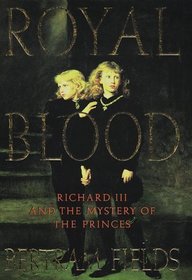Search -
Royal Blood: Richard III and the Mystery of the Princes
Royal Blood Richard III and the Mystery of the Princes
Author:
With his hunched back and withered arm, Richard scuttles across the stage like a huge spider, spewing out his venomous thoughts. "Since I cannot prove a lover," he confides to the hushed audience, "I am determined to prove a villain." And he means it. As the drama unfolds this grotesque villain kills the youthful Prince of Wales and the aged, s... more »
Author:
With his hunched back and withered arm, Richard scuttles across the stage like a huge spider, spewing out his venomous thoughts. "Since I cannot prove a lover," he confides to the hushed audience, "I am determined to prove a villain." And he means it. As the drama unfolds this grotesque villain kills the youthful Prince of Wales and the aged, s... more »
ISBN-13: 9780060392697
ISBN-10: 006039269X
Publication Date: 10/1/1998
Pages: 335
Rating: 2
ISBN-10: 006039269X
Publication Date: 10/1/1998
Pages: 335
Rating: 2
4 stars, based on 2 ratings
Publisher: ReganBooks
Book Type: Hardcover
Other Versions: Paperback
Members Wishing: 1
Reviews: Amazon | Write a Review
Book Type: Hardcover
Other Versions: Paperback
Members Wishing: 1
Reviews: Amazon | Write a Review
Genres:
- History >> Europe >> England >> General
- Literature & Fiction >> British & Irish >> Shakespeare




